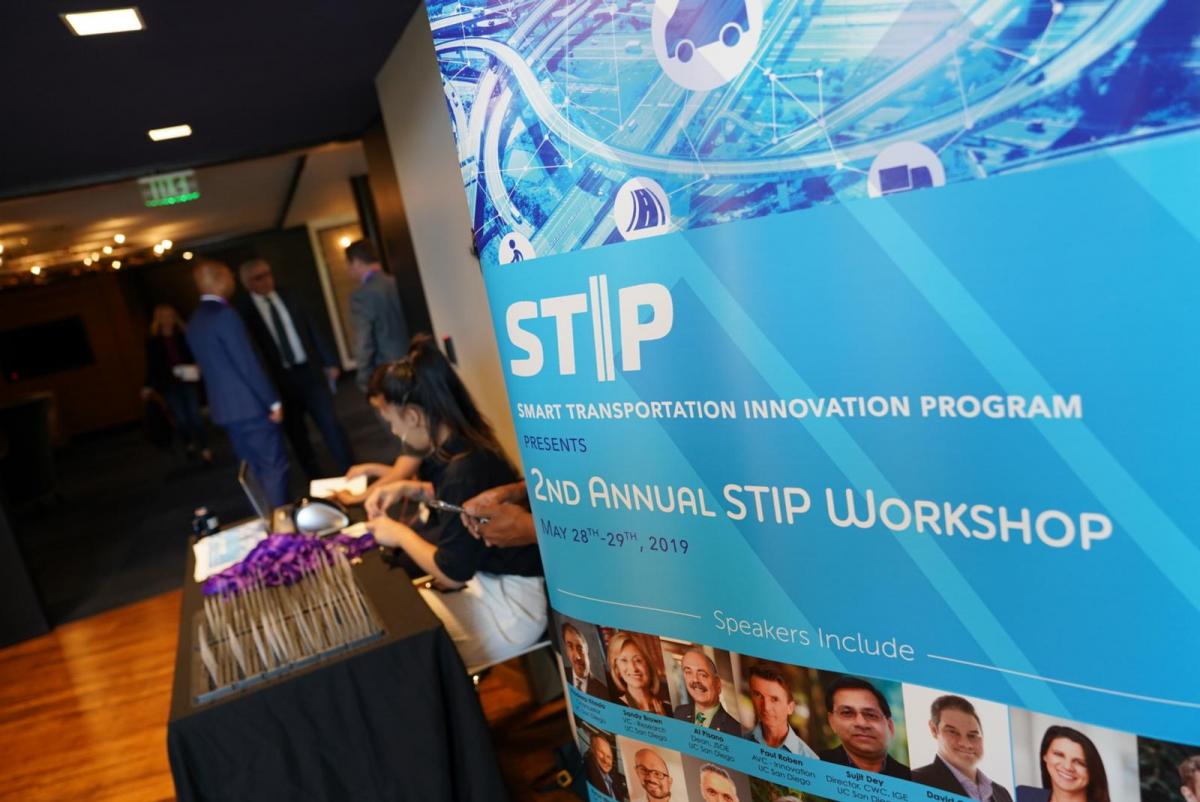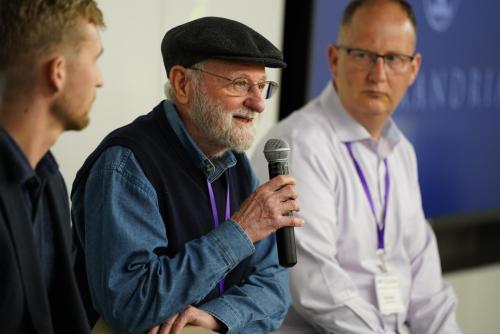Smart, Sustainable, Safe Transportation Effort Expands
San Diego, Calif., June 7, 2019 -- The Smart Transportation Innovation Program, a UC San Diego-based global collaboration of academic, industry and community partners, celebrated its first year with a workshop highlighting the progress the program has made toward its goal of smart, sustainable and safe transportation solutions, and offering ideas of what the consortium will focus on in the future.
STIP launched in March 2018 as a collaboration between UC San Diego, the City of San Diego, the City of Ulsan in Korea, Ulsan National Institute of Science and Technology (UNIST), and several industry partners. The goal of STIP is to address the design, technology and policy challenges of developing the transportation infrastructure of future smart cities, using the San Diego and Ulsan regions as test beds.
|
|
| Don Norman, director of the Design Lab at UC San Diego, addresses the human behavior aspect of transportation changes. |
Since its launch, the program has attracted additional industry partners including Black and Veatch, Primo Wind, Qualcomm, CleanTech San Diego, AT&T, TuSimple and National Instruments, and has expanded its regional partners to include the City of Carlsbad and the City of Chula Vista.
“The thing that I think makes this effort and program stand out, is that it epitomizes what many universities have been trying to do across the country and what the National Academics of Science, Engineering and Medicine recommend by way of open science,” said UC San Diego Vice Chancellor of Research Sandra Brown. “It is open science by design, it’s sharing our research information by design, it’s addressing practical community problems by design and it’s that integration of basic research with answering critical community questions and issues that make STIP unique and a model for the nation and a model for the globe.”
| Sujit Dey, director of STIP, and Sandra Brown, vice chancellor of research, spearheaded the STIP effort for UC San Diego a year ago. |
In its first year, the STIP consortium has worked on projects to enable data sharing between cars, pedestrians, and city infrastructure like smart traffic lights, which will be key to enabling truly autonomous transportation options. STIP launched its first testbed on campus as a way to be able to practically implement some of the solutions that are being researched and developed for real time data sharing, with further plans to expand the testing ground across the region through its partnerships with the cities. Besides real-time data fusion and data intelligence algorithms, the testbed is implementing an innovative and massively distributed computing and communications architecture, including small roadside units consisting of unlicensed and mmWave band radios and edge computing nodes. The campus itself is also serving as a testbed, as researchers in the Contextual Robotics Institute are turning campus into a living laboratory for self-driving cars, starting with mail delivery carts.
The cities of San Diego, Chula Vista and Carlsbad are also working on innovative transportation options to reduce traffic congestion and emissions, including micro mobility solutions such as shared bikes and scooters. Gathering additional relevant data from users to better understand where these different platforms should be located in the city or what restrictions should be set on them is an area of future focus.
“The goal of STIP is to break the silos and create an open, collaborative data sharing environment,” said Sujit Dey, professor of electrical and computer engineering at UC San Diego, and director of the Institute for the Global Entrepreneur, the Center for Wireless Communications, and the Smart Transportation Innovation Program. “Part of the effort is ensuring that we’re solving real problems, which is why translating STIP research into startups and companies is a key metric of the program, as well.”
Electric vehicle charging is also a topic of future work for STIP collaborators. In San Diego, about 55 percent of all greenhouse gas emissions are from transportation---cutting back on single occupancy car trips is one part of the solution, but increasing the percentage of electric vehicles is another key piece of the puzzle. That comes with data challenges (when and where do charging stations need to be available); human behavior challenges (how can we convince users to charge at off-peak hours) and power grid challenges (can we use electric vehicles as distributed energy sources, not just sinks, as local startup Nuvve is attempting to do).
STIP partners are working collaboratively to provide answers to these questions.
“We’re trying to be the place where new ideas and concepts can be tested,” said David Graham, chief innovation officer at the City of Carlsbad. “We’re helping align city infrastructure to power the transportation of the future. There is no more perfect time for innovation in mobility—locally and globally—than now."
MEDIA CONTACTS:
Katherine Connor
Jacobs School of Engineering
Phone: 858-534-8374
khconnor@eng.ucsd.edu

